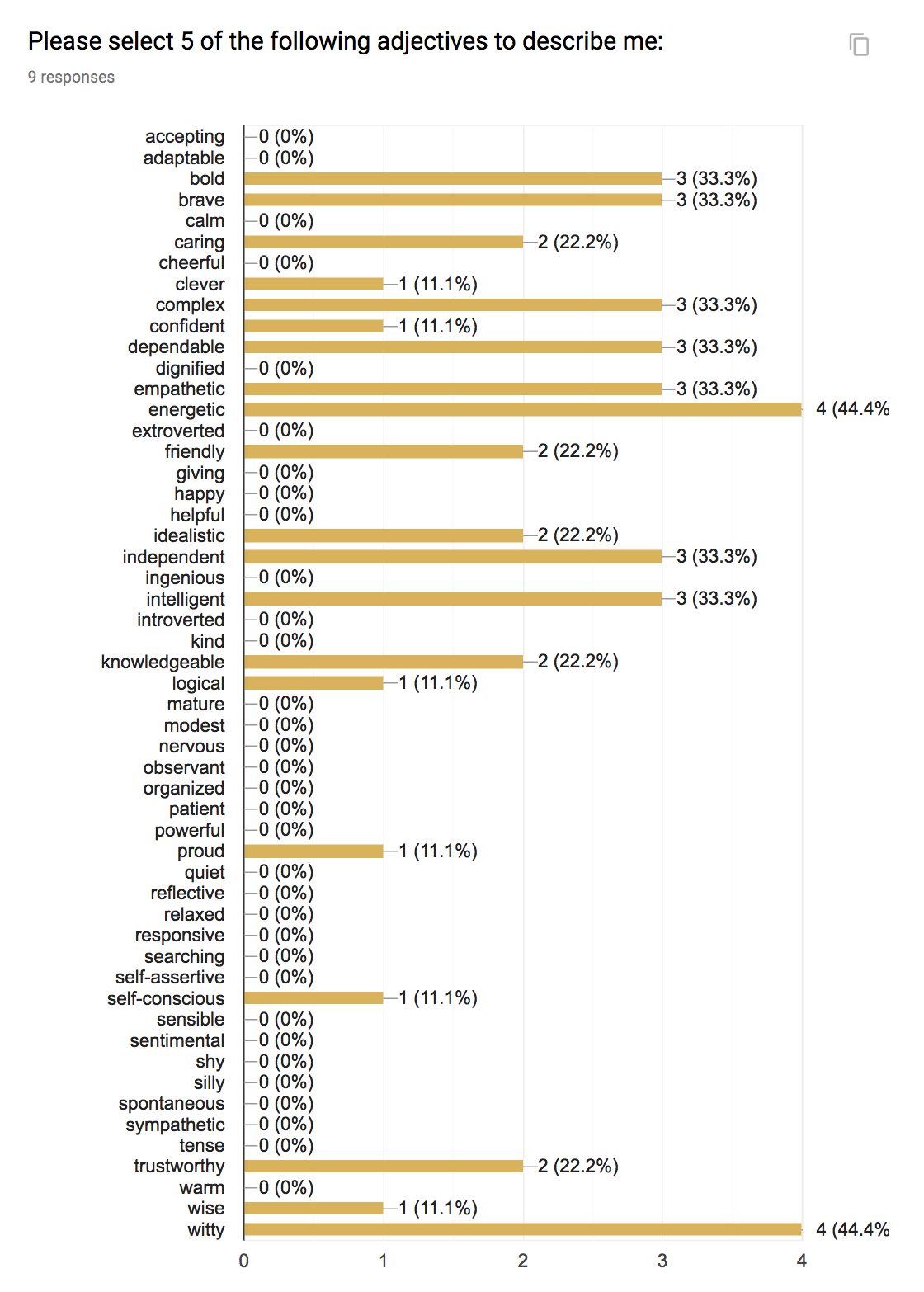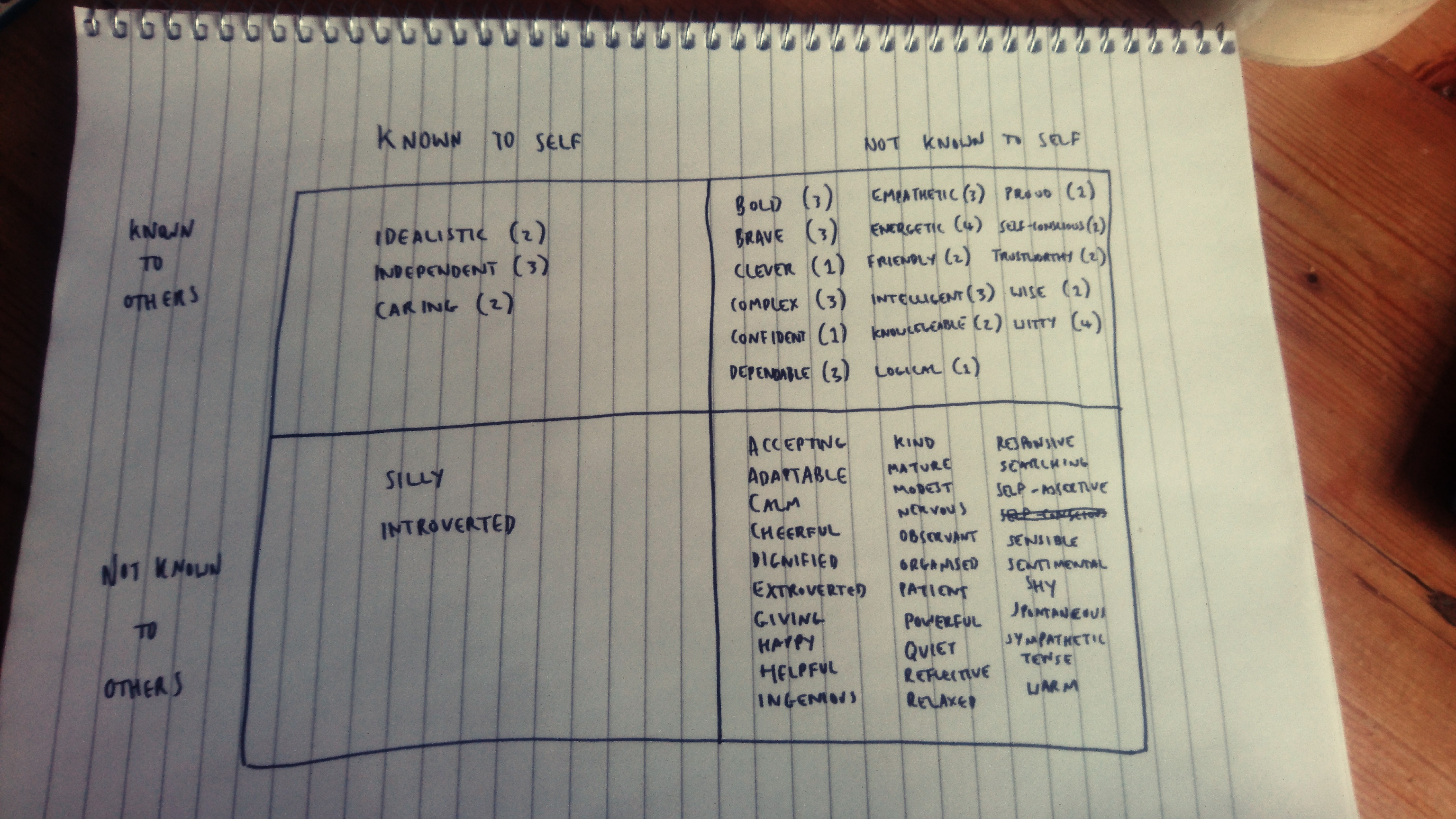Co-op Digital Leaving Feedback
I’ve been a fan of Anna Shipman for a while, since watching her “Building in the Open” talk - which was ace, because it gives me a well-thought out and argued talk to show to people when I’m flailing my arms like a cartoon character trying to explain why nobody cares about most of our code.
ANYWAY, a while back she wrote a great piece on leaving feedback, and I decided to pinch the approach. Turns out, it was a useful exercise.
Johari window
I’m not going to go into what this is in detail - see Anna’s post or Wikipedia for the details. The TL;DR is that this is a heuristic for working out what the impedance mismatch is between your perception of yourself and others’ perception of you. Kind of like Myers-Briggs is for thinking preferences, but for behaviours, maybe? I digress.
I asked about fifteen people from various teams and disciplines that I’d worked with, as well as some of the folks that I’ve reported to at various points. Everybody’s understandably busy, but I got nine responses, which is more than enough for this exercise.
So, here’s the window I drew with the results:
Observations
Some things jumped out at me straight away:
- People recognised that I give a shit, to be frank, with ‘idealistic’ and ‘caring’ appearing both for me and others
- A number of people put ‘complex’, and I’m not clear if that’s a good thing or a bad thing in the workplace
- Granted, it’s a bit of an odd term, but nobody put ‘introverted’, or really any of the introverted behaviours. This makes sense - it suggests that I work as an extrovert in the workplace, and it’s why I crash when I get home. This would also come out in the written feedback.
- Several people put ‘witty’, which is surprising as my jokes are bad and my pop culture references obscure - I think I described the same tendency using the word ‘silly’, but hey, if people enjoy my clowning around then I’m happy either way.
Also, the form wasn’t anonymous, so I could contextualise a little bit why people might have said a particular thing and give me some additional information to reflect on. As it was, there were a few things that I spotted immediately.
- ‘Dependable’ was used by both of the folks that I managed. My priority was always them, even up to and including the way I left, and the timing of it, so I’m glad they felt supported. The head of community also used it, which also made me feel good, as she often had a ridiculous workload, and I tried to do what little I could to help.
- ‘Trustworthy’ was used by both of the principals/tech leads I worked closely with, which is good. I trust others to do a good job, and it makes me feel good when others trust me in return - even if I can’t always succeed.
- ‘Complex’ and ‘brave’ were both used by two more senior folks I worked with at the strategy level where politics comes into play. I’d rather be ‘complex’ than simple, naturally, but I feel like I need to reflect on this a little more.
All in all, I’m pretty happy with that. It broadly makes me think that at a high level, I’m on the right track.
However - spoiler alert - I also asked for more detailed feedback. Although not everybody filled it in, there were a lot of things that came out of this that I’ll have to work on, and some that are actively a cause for concern.
And here’s the raw data:

Written feedback
I also asked for a few free-text written feedback sections, and lots interesting came out of this.
I think in terms of whether I succeeded in what I set out to do in Digital I probably failed by my own measure, but it wasn’t really until I decided to go that a bunch of ways in which I did have an impact came out of the woodwork.
What I’ve realised in hindsight is that in a larger organisation, the impact you have on people is usually disproportionately more important than lines of code checked in. Now, personally, that alone isn’t enough to scratch my itch to build stuff, but I’m glad I helped where I could, and the feedback I got has helped to re-frame to some extent my perception of my time at Co-op in a much more positive light.
Either way, it’s an important learning.
The good
I got a fair bit of praise for being supportive and knowledgeable - I’ll take that.
- “Always helpful, always supportive. Expert knowledge and open minded. Great at challenging thinking.”
- “You’ve modeled great behaviours. Seeking people’s advice, running after big goals, trying to affect change, diving into recruitment and the community, and seeking to make things better.”
- “provided great challenge to ways of thinking [and] approach, hugely supportive…get stuck in where needed, work well across disciplines”
- “You have created relationships between digital and other parts of the business.”
- “You’ve earned people’s trust. For example when folk hand in their notice one of the first things [we do] is take them off recruitment. [We] didn’t even consider that with you.”
I also got some really nice feedback around mentoring and training/supporting the people around me on teams. I feel like this is part of the feedback I don’t want to share publicly as it’s personal between me and other people, but my colleague Paul said something really interesting, that I think I will use as a heuristic in future off the back of this topic:
One of my measures for a “senior engineer” is that they make engineers better at least as much as they make code.
I think this cuts to the heart of both technical (line) management and the culture of a large organisation, but hey, Paul’s a smart guy.
Where do I need support?
I asked the question “Where do I need support?” as my very smart friend James mentioned in passing that when checking references that’s the question he leads with. I thought that was great, so I nicked it, and the results were probably the most useful feedback I received in all my time at Digital. Not all of it was new, granted, but somehow people really hit the nail on the head, and gave me a lot to think about and work on.
- I repeatedly got feedback on my communication style, which fell into a number of broad areas for improvement:
- Don’t assume other people have all the context already
- Don’t long sentences
- Don’t use unnecessary technical detail
- Change your speaking style more radically for different audiences
- Speak more slowly
- I got some feedback both on being over-confident and under-confident, so I think there’s something there on consistency
- Patience and follow-through on longer-term projects
- Both of the folks that I worked on higher-level stuff with had a version of this comment, and I agree that my battering-ram approach is probably not well suited to a lot of these situations.
And some quotes from the feedback:
- “Work on socialising things and bringing people with you”
- “Give people time to absorb what you said”
- “Sometimes you move too fast and assume too much”
The ugly
Okay, so I also had some feedback that gave me not just pause for thought but rang alarm bells. I think it’s kind of important to share that as well as just the positive stuff and areas for growth.
For the question, ‘What could I do less of?’ somebody I worked with from another area of the business said:
Giving over a perception that you’re disappointed with people.
I think there’s a lot to unpack here - and yes, admittedly this hit home because I know it’s basically true. I have high standards for myself and expect others to set high standards for themselves, and for one reason or another, I’m often disappointed. However, I didn’t realise that what are usually private thought bubbles are coming out in public.
Not only is this something I need to consider in future, but I probably need to change either my expectations or my attitude, because even a brief reflection leads one to the conclusion that this isn’t exactly fair.
I’m already aware of this tendency to the extent that a Jamie Lenman lyric has really stuck with me over the years since I first heard it:
So now you know / So now you see / Why it’s so hard to please me / I measure myself / And I measure you all / Against an impossible rule
So yeah, a bit dark, that one. I think any growth as a leader will have to take this into account, because if one person can see this, others can too - and it’s not exactly an attractive behaviour, even if I am prepared to be pretty frank about it.
Anyway, onto something a little lighter - pair programming.
I’m somewhat critical of pair-programming; to me, it’s a tool in the toolbox that’s great for dealing with hard bugs, legacy code or onboarding/training, but it’s not my preferred way of working. I got very pointedly called out on this by a colleague, and I think I’ll be following up to get to the bottom of this.
There’s something about your negativity towards pairing that I can’t quite express… Despite that a lot of your work is collaborative as far as I can tell.
Finally, I had some good feedback on pace, cadence and mental health. It definitely isn’t something I’ve taken us much care of at Co-op as perhaps I should have, and others brought it up.
I’ve been prone to burn-out in the past and I don’t always manage my energy levels super-well. Despite kind of knowing this, I haven’t done everything I should have to deal with it, and I got called out a couple of times over it, meaning it’s definitely something I will have to reflect and work on.
[You need support with] being able to work at more than one speed. [It] feels like you’re only able to throw 100% into anything which (I think) leaves you mentally exhausted.
Somebody else came at this from a different angle:
[You spend] all your energy on dealing with people. You have great self awareness of when you’re doing it and when you’ve used up your energy. However you still keep on going (through the power of sweets and coffee). It seems this is the biggest area where you needed support.
Wrapping up
Anyway, that’s it. I’m kind of shattered from having dug through all this and thought about it.
I’d recommend this exercise, if nothing else it will make you feel like you did achieve something during your time with an employer[0].
Speaking of recommending, the folks I worked with at Co-op Digital were completely brilliant and you can learn an astonishing amount from them. They’re currently hiring, so if you’re in Manchester and looking for a job, you should seriously consider talking to them.
[0] Not a guarantee


